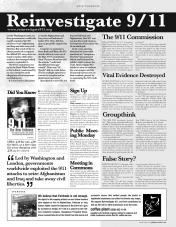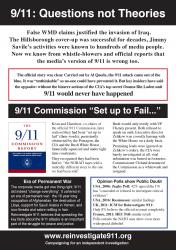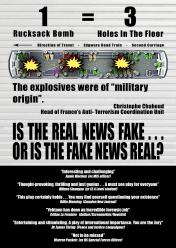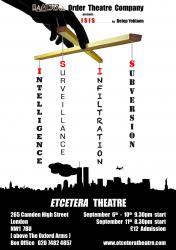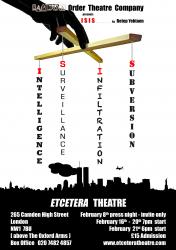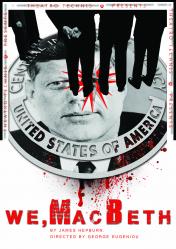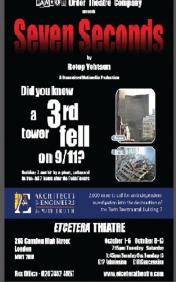New York Times And CIA Collusion - 9/11 Implications
Washington's press is the cabin boy of the political class – do quote me on that
Desperate for scraps from official Washington sources, many US reporters are now co-conspirators in an ongoing fraud
The weather here in Washington this week was hot and humid. That's on background, of course. Do not quote me. You can use the information only if you attribute to "a beltway source who could not be named because he is not authorised to speak about meteorology".
Here's what you can quote me on: such ridiculous, pusillanimous, deceitful attributions are a standard tool of the Washington press corps, which as a group is too caught up in its own self-importance and petty competition to understand it has become the cabin boy of the political class. In the name of supposedly informing the audience, Washington reporters are co-conspirators in an ongoing fraud. Here's what it looks like:
USA Today: "Mitt Romney is planning a bus tour ahead of the Republican national convention. A Romney campaign aide confirmed the bus trip to USA Today. The aide, who is not authorised to discuss the trip publicly, asked for anonymity because details have not yet been announced." They have been announced now.
These are not whistleblowers being protected, or even insiders going out on a limb. The epidemic of blind quotes [when interviewees don't want to say anything on the record] is a standard way of giving a platform to officials speaking in an official capacity, yet with zero accountability. The practice is also supremely manipulative, giving the most banal information the allure of forbidden fruit.
At its worst, the game can allow the vice president of the United States to leak phony intelligence to the New York Times and later refer back to the leak as independent journalistic confirmation, leading to invasion and hundreds of thousands of deaths and a trillion dollars in squandered treasure.
On the plus side, the Times scooped everyone.
The Iraq disgrace aside, obscuring official sources might be understandable if this journalistic worst practice were in the service of earth-shaking news. It almost never is. Here are some blind quotes from just the last few days:
The Atlantic: "A former McCain staffer who saw the summary of Romney's tax data independently confirmed former Republican presidential nominee John McCain's account that there was nothing disqualifying in it, but said he was not authorised to provide more detail from the confidential report."
Associated Press: "The Democratic official would not comment on the exact language of the pro-gay marriage plank approved by the drafting committee. It was unclear if the party would call for any national action to legalise gay marriage . The official spoke on the condition of anonymity because they were not authorised to speak publicly about the platform committee's decision."
Reuters: "Members of the Federal Trade Commission voted to approve a consent decree that will allow Google to settle the agency's investigation but admit no liability, said one of the sources, who was not authorised to speak on the record."
And here's the thing about epidemics: they spread. In recent days, anonymity was provided to sources in stories about investments, the courts, an NBA player trade, a shopping-centre sale in Sacramento, California and at least one huge development of historic significance: concern over Jimmy Fallon hosting the Oscars:
LA Times: "ABC has raised objections to having the late-night star from rival NBC play emcee on its Oscar broadcast, these people said, but the network has no authority to veto the choice of host. The show is put on by the Motion Picture Academy, and Tom Sherak initiated the discussions before his term as academy president ended on Tuesday, according to the people who were not authorised to speak publicly."
The blind quotes, though, are not even the worst of it. The New York Times recently revealed that reporters are not merely working on background, they negotiate after interviews what comments may be used and send them to sources for prepublication approval. The sources routinely edit those quotes before turning them back over to news organisations.
As media ethicist Edward Wasserman so aptly put it, "At this point you're no longer talking about an interview; you're talking about a press release … And what happens is Washington becomes no different from Beijing, in terms of reporting what authorities want reported".
Once again, this turns out not to be some sort of rare practice confined to sleazy blogs. It is a sleazy practice embraced by the most venerable journalism institutions, desperate to feed on the scraps offered by official Washington, no matter how degrading and unscrupulous the transaction. One Washington Post reporter was caught sharing an entire draft of a story about Texas learning standards with university of Texas officials.
The backlash was swift. Embarrassed by the revelation, the Post issued updated policies on quote approval and draft-sharing, absolutely forbidding the practices. Absolutely and unequivocally. Except when the reporter and editor agree it's OK.
"We should not allow sources to change what was said in an original interview," said executive editor Marcus Brauchili in a memo, "although accuracy or the risk of losing an on-the-record quote from a crucial source may sometimes require it. A better and more acceptable alternative is to permit a source to add to a quotation and then explain that sequence to readers."
You tell 'em, Marcus. Take no prisoners.
Meanwhile, the National Journal and Bloomberg news followed the McClatchey Newspapers Washington bureau in instituting a real ban on quote sharing, as articulated by McClatchey bureau chief Jim Asher: "I make this commitment to our readers, and to our citizens: McClatchy journalists will report fairly and independently. We will not make deals with those in power, regardless of party or philosophy."
Yes, they got scooped on the Romney bus blockbuster. All they have now is their independence. And their dignity.
Here is smoking gun evidence of Annie Machon's conclusions from her own experience: the intel services have moles in the editorial process at the major western media outlets.
Correspondence and collusion between the New York Times and the CIA
Mark Mazzetti's emails with the CIA expose the degradation of journalism that has lost the imperative to be a check to power
The rightwing transparency group, Judicial Watch, released Tuesday a new batch of documents showing how eagerly the Obama administration shoveled information to Hollywood film-makers about the Bin Laden raid. Obama officials did so to enable the production of a politically beneficial pre-election film about that "heroic" killing, even as administration lawyers insisted to federal courts and media outlets that no disclosure was permissible because the raid was classified.
Thanks to prior disclosures from Judicial Watch of documents it obtained under the Freedom of Information Act, this is old news. That's what the Obama administration chronically does: it manipulates secrecy powers to prevent accountability in a court of law, while leaking at will about the same programs in order to glorify the president.
But what is news in this disclosure are the newly released emails between Mark Mazzetti, the New York Times's national security and intelligence reporter, and CIA spokeswoman Marie Harf. The CIA had evidently heard that Maureen Dowd was planning to write a column on the CIA's role in pumping the film-makers with information about the Bin Laden raid in order to boost Obama's re-election chances, and was apparently worried about how Dowd's column would reflect on them. On 5 August 2011 (a Friday night), Harf wrote an email to Mazzetti with the subject line: "Any word??", suggesting, obviously, that she and Mazzetti had already discussed Dowd's impending column and she was expecting an update from the NYT reporter.
A mere two minutes after the CIA spokeswoman sent this Friday night inquiry, Mazzetti responded. He promised her that he was "going to see a version before it gets filed", and assured her that there was likely nothing to worry about:
"My sense is there a very brief mention at bottom of column about CIA ceremony, but that [screenwriter Mark] Boal also got high level access at Pentagon."
She then replied with this instruction to Mazzetti: "keep me posted", adding that she "really appreciate[d] it".
Mazzetti
Moments later, Mazzetti forwarded the draft of Dowd's unpublished column to the CIA spokeswoman (it was published the following night online by the Times, and two days later in the print edition). At the top of that email, Mazzetti wrote: "this didn't come from me … and please delete after you read." He then proudly told her that his assurances turned out to be true:
"See, nothing to worry about."
Mazzetti2
This exchange, by itself, is remarkably revealing: of the standard role played by establishment journalists and the corruption that pervades it. Here we have a New York Times reporter who covers the CIA colluding with its spokesperson to plan for the fallout from the reporting by his own newspaper ("nothing to worry about"). Beyond this, that a New York Times journalist – ostensibly devoted to bringing transparency to government institutions – is pleading with the CIA spokesperson, of all people, to conceal his actions and to delete the evidence of collusion is so richly symbolic.
The relationship between the New York Times and the US government is, as usual, anything but adversarial. Indeed, these emails read like the interactions between a PR representative and his client as they plan in anticipation of a possible crisis.
Even more amazing is the reaction of the newspaper's managing editor, Dean Baquet, to these revelations, as reported by Politico's Dylan Byers:
"New York Times Managing Editor Dean Baquet called POLITICO to explain the situation, but provided little clarity, saying he could not go into detail on the issue because it was an intelligence matter.
"'I know the circumstances, and if you knew everything that's going on, you'd know it's much ado about nothing,' Baquet said. 'I can't go into in detail. But I'm confident after talking to Mark that it's much ado about nothing.'
"'The optics aren't what they look like,' he went on. 'I've talked to Mark, I know the circumstance, and given what I know, it's much ado about nothing.'"
There is so much to say about that passage.
First, try though I did, I'm unable to avoid noting that this statement from Baquet – "the optics aren't what they look like" – is one of the most hilariously incoherent utterances seen in some time. It's the type of meaningless, illiterate corporatese that comes spewing forth from bumbling executives defending the indefensible. I've read that sentence roughly a dozen times over the last 24 hours and each time, it provides me with greater amounts of dark amusement.
Second, look at how the New York Times mimics the CIA even in terms of how the newspaper's employees speak: Baquet "provided little clarity, saying he could not go into detail on the issue because it was an intelligence matter". In what conceivable way is Mazzetti's collusion with the CIA an "intelligence matter" that prevents the NYT's managing editor from explaining what happened here?
This is what the CIA reflexively does: insists that, even when it comes to allegations that they have engaged in serious wrongdoing, you (and even courts) cannot know what the agency is doing because it is an "intelligence matter". Now, here we have the managing editor of the Newspaper of Record reciting this same secrecy-loving phrase verbatim – as though the New York Times is some sort of an intelligence agency whose inner workings must be concealed for our own safety – all in order to avoid any sort of public disclosure about the wrongdoing in which it got caught engaging. One notices this frequently: media figures come to identify so closely with the government officials on whom they report that they start adopting not only their way of thinking, but even their lingo.
Third, note how Baquet proudly touts the fact that he knows facts to which you are not and will not be privvy:
"I know the circumstances, if you knew everything that's going on, you'd know it's much ado about nothing."
Isn't the function of a newspaper supposed to be to tell us "everything that's going on", not to boast that it knows the circumstances and you do not?
Baquet's claim that this was all "much ado about nothing" did not, apparently, sit well with at least some people at the New York Times, who seem not to appreciate it when their national security reporter secretly gives advanced copies of columns to the CIA spokesperson. Shortly after Baquet issued his ringing defense of Mazzetti's behavior, a spokesperson for the paper not only provided the details Baquet insisted could not be given, but also made clear that Mazzetti's conduct was inappropriate:
"Last August, Maureen Dowd asked Mark Mazzetti to help check a fact for her column. In the course of doing so, he sent the entire column to a CIA spokeswoman shortly before her deadline. He did this without the knowledge of Ms Dowd. This action was a mistake that is not consistent with New York Times standards."
It may be "inconsistent with the New York Times standards" for one of its reporters to secretly send advanced copy to the CIA and then ask that the agency delete all record that he did so: one certainly hopes it is. But it is not, unfortunately, inconsistent with the paper's behavior in general, when it comes to reporting on public officials. Serving as obedient lapdogs and message-carriers for political power, rather than adversarial watchdogs over power, is par for the course.
The most obvious example of this is the paper's complicity with propagating war-fueling falsehoods to justify the attack on Iraq – though, in that instance, it was hardly alone. Just last month, it was revealed that the NYT routinely gives veto power to Obama campaign officials over the quotes from those officials the paper is allowed to publish – a practice barred by other outlets (but not the NYT) both prior to that revelation and subsequent to it.
Worse, the paper frequently conceals vital information of public interest at the direction of the government, as it did when it learned of George Bush's illegal eavesdropping program in mid 2004 but concealed it for more than a year at the direction of the White House, until Bush was safely re-elected; as it did when it complied with government directives to conceal the CIA employment of Raymond Davis, captured by Pakistan, even as President Obama falsely described him as "our diplomat in Pakistan" and as the NYT reported the president's statement without noting that it was false; and as it did with its disclosure of numerous WikiLeaks releases, for which the paper, as former executive editor Bill Keller proudly boasted, took direction from the government regarding what should and should not be published.
And that's all independent of the chronic practice of the NYT to permit government officials to hide behind anonymity in order to disseminate government propaganda – or even to smear journalists as al-Qaida sympathizers for reporting critically on government actions – even when granting such anonymity violates its own publicly announced policies.
What all of this behavior from the NYT has in common is clear: it demonstrates the extent to which it institutionally collaborates with and serves the interests of the nation's most powerful factions, rather than act as an adversarial check on them. When he talks to the CIA spokesperson, Mazzetti sounds as if he's talking to a close colleague working together on a joint project.
It sounds that way because that's what it is.
One can, if one wishes, cynically justify Mazzetti's helpful co-operation with the CIA as nothing more than a common means which journalists use to curry favor with their sources. Leave aside the fact that the CIA spokesperson with whom Mazzetti is co-operating is hardly some valuable leaker deep within the bowels of the agency but, in theory, should be the supreme adversary of real journalists: her job is to shape public perception as favorably as possible to the CIA, even at the expense of the truth.
The more important objection is that the fact that a certain behavior is common does not negate its being corrupt. Indeed, as is true for government abuses generally, those in power rely on the willingness of citizens to be trained to view corrupt acts as so common that they become inured, numb, to its wrongfulness. Once a corrupt practice is sufficiently perceived as commonplace, then it is transformed in people's minds from something objectionable into something acceptable. Indeed, many people believe it demonstrates their worldly sophistication to express indifference toward bad behavior by powerful actors on the ground that it is so prevalent. This cynicism – oh, don't be naive: this is done all the time – is precisely what enables such destructive behavior to thrive unchallenged.
It is true that Mazzetti's emails with the CIA do not shock or surprise in the slightest. But that's the point. With some noble journalistic exceptions (at the NYT and elsewhere), these emails reflect the standard full-scale cooperation – a virtual merger – between our the government and the establishment media outlets that claim to act as "watchdogs" over them.
From "All the news that's fit to print" to "please delete after you read" and cannot "go into detail because it is an intelligence matter": that's the gap between the New York Times's marketed brand and its reality.
* * * * *
UPDATE: The Times' Public Editor weighed in on this matter today, noting his clear disapproval for what Mazzetti did:
"Whatever Mr. Mazzetti's motivation, it is a clear boundary violation to disclose a potentially sensitive article pre-publication under such circumstances. This goes well beyond the normal give-and-take that characterizes the handling of sources and suggests the absence of an arm's-length relationship between a reporter and those he is dealing with."
While Mazzetti himself expresses regret for his behavior -- "It was definitely a mistake to do. I have never done it before and I will never do it again" -- both he and Executive Editor Jill Abramson insist that he had no bad intent, but was simply trying to help out a colleague (Dowd) by having her claims fact-checked. Like Baquet, Abramson invokes secrecy to conceal the key facts: "I can't provide further detail on why the entire column was sent."
The question raised by these excuses is obvious: if Mazzetti were acting with such pure and benign motives, why did he ask the CIA to delete the email he sent? This appears to be a classic case of expressing sorrow not over what one did, but over having been caught.
On a different note, Politico's Byers, in response to my inquiry, advises me that Baquet did indeed say what Byers attributed to him -- "he could not go into detail on the issue because it was an intelligence matter" -- and that his exact quote was: it "has to with intel."




